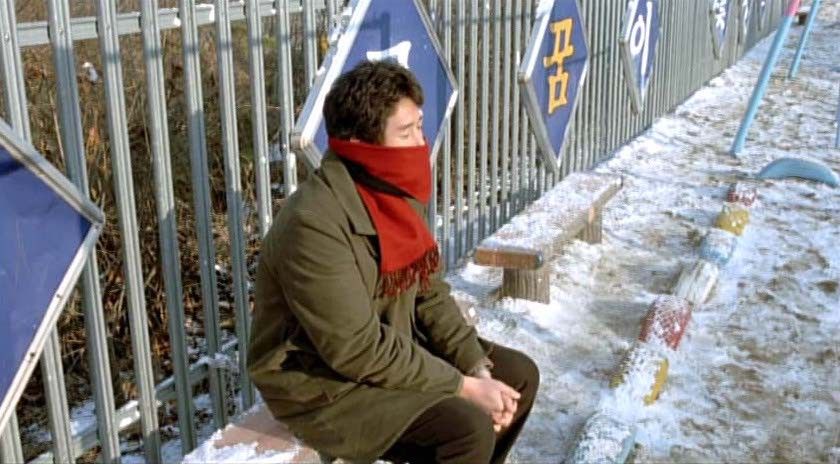Woman is the Future of Man (Hong Sangsoo, 2004)

After finding increasing warmth amidst narrative experimentation and a shearing away of formal adornment, with his fifth film Hong Sangsoo returns to the cruel satire of his debut. A bitter and cruel skewering of the pretensions, hypocrisies and stupid lusts of the modern man, the film is relentlessly bleak, offering no hope for escape into fantasy or the creative refusal to submit to the laws of social relationships. The only way out for his hero, such as he is, is to runaway as fast as he can.
Two old friends meet up in a wintery Seoul. Hyeongon (Kim Taewoo) is a film director, just returned from school in America (Hong himself studied in the US, first in California and then in Chicago). His pal is Munho (Yoo Jitae), an art teacher married to an unseen woman. During a long meal/drinking session, each man’s mind flashes back to their relationship with a woman named Seonhwa (Sung Hyunah). She and Hyeongon had been dating before he left for America, but then drifted apart over the long distance. Munho, unbeknownst to Hyeongon, had carried on an affair with her while his friend was away. After each flirting sleazily with the waitress at their restaurant (Would you like to be in a film? Would you like to pose nude, for art?), they decide to go visit Seonhwa. They drink more, a lot more, and each has a sexual encounter with her that night. The next day, Munho splits off from the trio to hang out with some of his students, one of whom he takes to a sex motel. Meanwhile, Hyeongon is heartbroken: he heard Seonhwa and Munho hook up the night before and, admonishing her, runs away.
This was Hong’s shortest film to date, and despite the continued refinement of his visual style, including the return of the deadpan dream sequence from The Day a Pig Fell Into the Well and its extension to the two flashbacks, where past and present, fact and fiction are separated merely by a cut, it’s his least interesting narrative. The bitterness is nothing less than oppressive, the comedy darker than ever (in the flashback: Seonhwa tells her boyfriend than an acquaintance kidnapped and raped her the day before. His response is to give her a thorough shower and “make love to (her) to cleanse (her).”) This is not the last time a woman will tell a Hong hero that she had been raped, and both times the hero handles it badly, to say the least. Of course, Hong doesn’t endorse the terrible behavior of the men in this film, but neither does he give the women any kind of agency or life outside their role as a vehicle for sex. He can’t: that’s how the men see them and we are locked inside their deranged point of view. The lack of an escape, or just a perspective different from the oppressive psyche of these vicious men, is to the film’s strength as a broad critique of masculinity, but it makes it tough to watch. I need some air.
